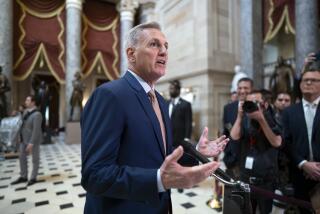Obama backs away from a Republican budget priority
WASHINGTON — Seeking to present a unified Democratic front in an election year, President Obama is backing away from a proposal to restrain spending on entitlement programs, focusing instead on economic priorities likely to please his party’s base.
Obama’s next budget will not include a change that would have slowed cost-of-living increases for Social Security and other programs, the White House said Thursday. The proposal, which was included in last year’s budget, was reviled by liberal Democrats but billed by Obama as a good-faith gesture intended to draw Republicans into deficit-reduction talks.
Senior advisors, however, acknowledged that the era when a “grand bargain” budget deal was conceivable had come to an end — at least for now. Rather than dangle an offer at Republicans, the president’s budget, scheduled for release in early March, would reflect only his spending priorities — however unlikely they are to pass the Republican-led House.
A president’s budget is always an aspirational exercise often ignored by lawmakers with their own plans. But it is even less important this year because Congress last fall hashed out a two-year fiscal blueprint negotiated by Sen. Patty Murray (D-Wash.) and Rep. Paul D. Ryan (R-Wis.).
Still, the document could prove helpful to Democrats at the start of the election season by focusing attention on the party’s economic agenda, which Obama’s congressional allies hope to highlight to draw sharp contrasts with Republicans.
Next week, House Democrats will take steps intended to force a vote on their proposal to raise the federal minimum wage to $10.10 an hour. The Senate could act on a similar measure in March, after making another attempt to extend long-term unemployment benefits.
Democrats face long odds in their bid to recapture the House in this year’s election, while their Senate majority appears increasingly fragile. The party, though, is seeking to reclaim the offensive after a bruising period dominated by problems with the rollout of the online marketplaces for Obama’s healthcare law.
The president’s decision to drop his divisive offer to reduce projected spending on entitlement benefits eliminates one of the party’s main internal debates.
House Minority Leader Nancy Pelosi (D-San Francisco) applauded the move, even as she said Democrats had “stood behind” Obama’s “honest efforts” to reach a major budget breakthrough.
But Brendan Buck, a spokesman for House Speaker John A. Boehner (R-Ohio), said Obama’s plans showed he “has no interest in doing anything, even modest, to address our looming debt crisis.”
“With three years left in office, it seems the president is already throwing in the towel,” he said.
The president’s now-abandoned proposal to replace the consumer price index with a new formula for cost-of-living increases called “chained CPI” would probably have resulted in savings in programs such as Social Security and Medicare. Obama had indicated his support for chained CPI in battles with Republicans over the debt ceiling and government funding, starting in 2011.
It was most recently a bargaining chip in the “fiscal cliff” discussions in late 2012, though many Democrats expressed strong opposition. Obama offered it again in his budget plan last year, when the White House said there was “a little bit more optimism” about concessions from Republicans.
A White House spokesman said the offer “remains on the table” if there are any new efforts to reach a major deficit-reduction deal of the sort Obama had discussed with Boehner in the past.
But such talks, in which Democrats sought new revenue from higher taxes and closed tax loopholes in exchange for spending reductions sought by Republican lawmakers, have been superseded by the Murray-Ryan agreement.
Washington has entered a rare fiscal cease-fire, with the threat of a government shutdown off the table until October and the nation’s borrowing capacity intact through March 2015.
“We’ve made substantial progress in reducing the deficit. There’s more that we can do, and that’s why the offer remains on the table,” said Josh Earnest, a White House spokesman. “But the president also believes it’s important that we start spending some time focusing on what kinds of policies we can put in place that will expand economic opportunity for every American.”
The White House said the president’s budget would adhere to the Murray-Ryan deal, but would propose $56 billion in spending dubbed an “opportunity, growth and security initiative” to be paid for by closing loopholes, making budget reforms and raising taxes on tobacco.
Those programs would include projects the president has pushed in recent years without winning much GOP support, such as a network of manufacturing research centers, expansion of public preschool, and an energy efficiency initiative in which states would compete for federal support.
kathleen.hennessey@latimes.com
More to Read
Start your day right
Sign up for Essential California for news, features and recommendations from the L.A. Times and beyond in your inbox six days a week.
You may occasionally receive promotional content from the Los Angeles Times.








